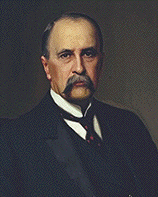July 12: William Osler
William Osler (1849)
It was on this date, July 12, 1849, the Anglo-American physician William Osler was born in Bond Head, Canada West (now Ontario). He took his MD in 1872 and taught medicine from 1874-1884. In 1889 he became the first professor of medicine at Johns Hopkins University and was one of the four founding professors in that Baltimore, Maryland, institution. By the turn of the century, he was the best-known physician in the English-speaking world and called the “most influential physician in history,” as well as “the Father of Modern Medicine.” He was Regius Chair of Medicine at Oxford from 1905 until his death at age 70 on 29 December 1919. In addition to being a physician, Osler was a book-lover, historian, author—and a renowned practical joker as “Egerton Yorrick Davis.” One of his innovations was to insist that medical students learn from seeing and talking to patients and the establishment of the medical residency. To this day, Osler’s name describes a number of diseases, signs and symptoms and is inscribed on the Osler Building at The Johns Hopkins Hospital.
William Osler once said, “One special advantage of the skeptical attitude of mind is that a man is never vexed to find that after all he has been in the wrong.” A skeptic toward revealed religion, yet Osler counseled faith (chiefly faith in oneself) and the utility if not the reality of belief in an afterlife. Osler might have been speaking of medicine or religion when he counseled, “In seeking absolute truth we aim at the unattainable, and must be content with broken portions” and “The greater the ignorance the greater the dogmatism.” His humanist ethic was visible in publications such as Counsels and Ideals (1905) and Michael Servetus (1909), and especially in his 1904 Ingersoll Lecture, Science and Immortality, in which he gives the scientific evidence against belief and adds,
It may be questioned whether more comfort or sorrow has come to the race since man peopled the unseen world with spirits to bless and demons to damn him.
Originally published July 2003 by Ronald Bruce Meyer.


